Appeals for GCSE, AS, A level and Project: 2018 to 2019 academic year
Updated 22 June 2020
Applies to England
1. Appeals for GCSE, AS, A level and Project qualifications: 2018/19 academic year
This release presents the number of appeals made during the 2018/19 academic year in England for GCSE, AS and A level and Project qualifications. It also gives information on and the number of qualification grades challenged and changed due to those appeals.
2. Main trends
-
The main trends in the number of appeals for GCSE and GCE (AS and A level) made following the 2018/19 academic year in England were:
-
Overall, 3,205 (0.05%) of the 5.9 million grades certified for GCSEs and AS/A levels were challenged.
-
Of the 3,205 grades challenged, 516 (16%) were changed.
-
The number of appeals received in 2018/19 was 1,254, an increase of 46% from 2017/18 where there were 857 appeals received. This is likely due to the new grounds for an appeal being extended to all GCSEs in 2018/19.
-
The number of grades challenged in 2018/19 was 3,205, an increase of 127% from 2017/18 where there were 1,412 grades challenged. This is likely due to the new grounds for an appeal being extended to all GCSEs in 2018/19.
-
The number of appeals upheld in 2018/19 was 683, an increase of 68% from 2017/18 where there were 406 appeals upheld. This is likely due to the new grounds for an appeal being extended to all GCSEs in 2018/19.
-
The number of grades changed in 2018/19 was 516, an increase of 154% from 2017/18 where there were 203 grades changed. This is likely due to the new grounds for an appeal being extended to all GCSEs in 2018/19.
-
The most common reason for appeals was review of marking - marking error.
-
Most upheld appeals resulted in no grade change.
-
A small proportion (3%) of preliminary appeals progressed to an appeal hearing.
3. Qualification and exam series breakdown in 2018/19

3.1 Number of appeals - 2018/19
| Exam series | GCE | GCSE | Project |
|---|---|---|---|
| November 2018 | - | 26 | 0~ |
| January 2019 | - | - | 0 |
| June 2019 | 482 | 746 | 6 |
| Total | 482 | 772 | 9 |
4. Total number of appeals received, upheld and leading to a grade change
An appeal may be submitted by a centre if they are dissatisfied with the result of a review of marking or moderation or if they wish to contest the outcome of a reasonable adjustment or special consideration request, or a malpractice decision. An appeal can represent one candidate, or several, if related to the same potential issue. The appeal may be upheld at either a preliminary appeal or an appeal hearing, and this may lead to a change in one or more qualification grades involved. If an appeal which progresses to an appeal hearing is not upheld but was upheld at a preliminary appeal, the appeal as a whole is reported as upheld. The data shown below contains appeals of all natures made to all exam boards.
The grounds for which an appeal can be made have recently been extended, so an appeal can be made on the basis of a marking or moderation error. The new grounds were introduced in 2016/17 for all GCE subjects, 2017/18 for GCSE English language, English literature and mathematics and in 2018/19 was extended to all remaining GCSEs. This is likely to have resulted in an increase in the number of appeals from 2016/17 onwards. Therefore, it is difficult to make direct comparisons across years.
4.1 GCSE


| Year | Appeals received (GCSE) | Appeals upheld (GCSE) | Appeals leading to a grade change (GCSE) | Proportion of appeals upheld (GCSE) |
|---|---|---|---|---|
| 2016/17 | 272 | 98 | 67 | 36% |
| 2017/18 | 489 | 263 | 148 | 54% |
| 2018/19 | 772 | 433 | 274 | 56% |
The number of GCSE appeals increased from 489 to 772 this year, an increase of 58%. The number of appeals upheld increased from 263 to 433 this year (an increase of 65%) and the number of appeals which led to a grade change has increased from 148 to 274 this year (an increase of 85%). The proportion of appeals upheld this year (56%) has increased, compared with 54% last year.
These increases are likely to be due to centres being able to appeal on the grounds of a marking error for all GCSE subjects in 2018/19.
4.2 GCE (AS and A level)


| Year | Appeals received (GCE) | Appeals upheld (GCE) | Appeals leading to a grade change (GCE) | Proportion of appeals upheld (GCE) |
|---|---|---|---|---|
| 2016/17 | 325 | 162 | 93 | 50% |
| 2017/18 | 368 | 143 | 69 | 39% |
| 2018/19 | 482 | 250 | 152 | 52% |
The number of GCE appeals increased from 368 in 2017/18 to 482 in 2018/19 (an increase of 31%). Additionally, the number of appeals which were upheld increased from 143 in 2017/18 to 250 in 2018/19 (an increase of 75%) and the number of appeals which led to a grade change increased from 69 in 2017/18 to 152 in 2018/19 (an increase of 120%). The proportion of GCE appeals which were upheld this year (52%) has increased, having previously decreased in 2017/18.
These increases are likely to be due to a greater awareness that centres are able to appeal on the grounds of a marking error for all GCE subjects since 2016/17.
5. Nature of appeals
An appeal can be made for a range of reasons: to contest the result of a review of marking or a review of moderation, or to contest a malpractice decision or a decision on reasonable adjustments or special consideration. In 2015/16, new grounds for appeals were piloted where an appeal could be made on the grounds of a marking error. In 2016/17, these grounds were introduced for all GCE subjects and, in 2017/18, they were introduced for GCSE English language, English literature and maths. In 2018/19 these grounds were introduced for all GCSE subjects.
5.1 GCSE
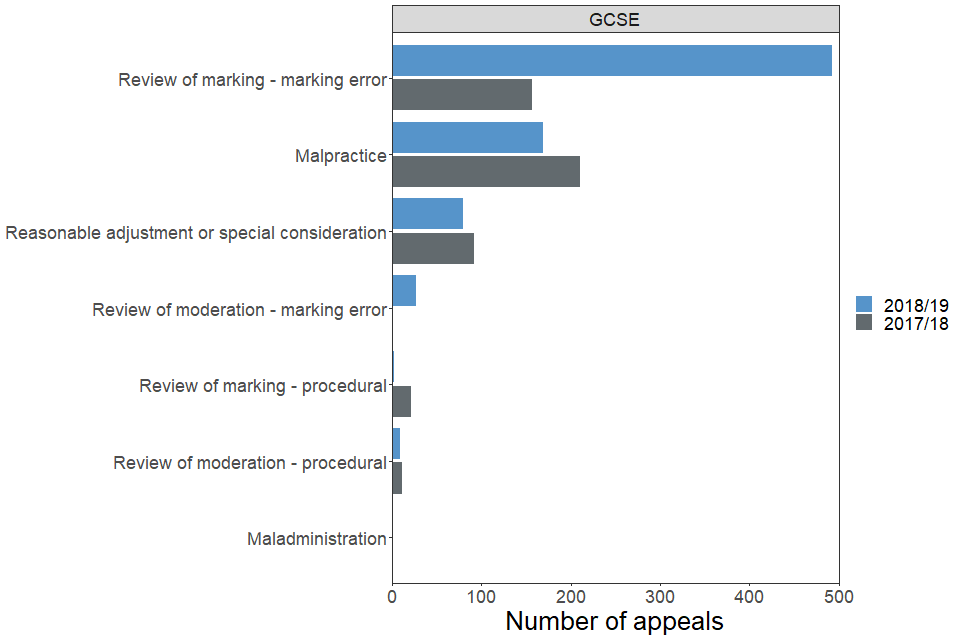
| Nature of appeal (GCSE) | 2017/18 | 2018/19 |
|---|---|---|
| Maladministration | 0 | 0 |
| Malpractice | 210 | 169 |
| Reasonable adjustment or special consideration | 92 | 79 |
| Review of marking - marking error | 157 | 492 |
| Review of marking - procedural | 21 | 0~ |
| Review of moderation - marking error | 0 | 27 |
| Review of moderation - procedural | 11 | 9 |
| Total | 491 | 778 |
For GCSE qualifications, the largest appeal category was ‘review of marking - marking error’. The number of appeals related to this category increased from 157 in 2017/18 to 492 in 2018/19 (an increase of 213%). Again, this is likely to be due to a marking error being a possible grounds for appeal for all GCSE subjects in 2018/19.
5.2 GCE
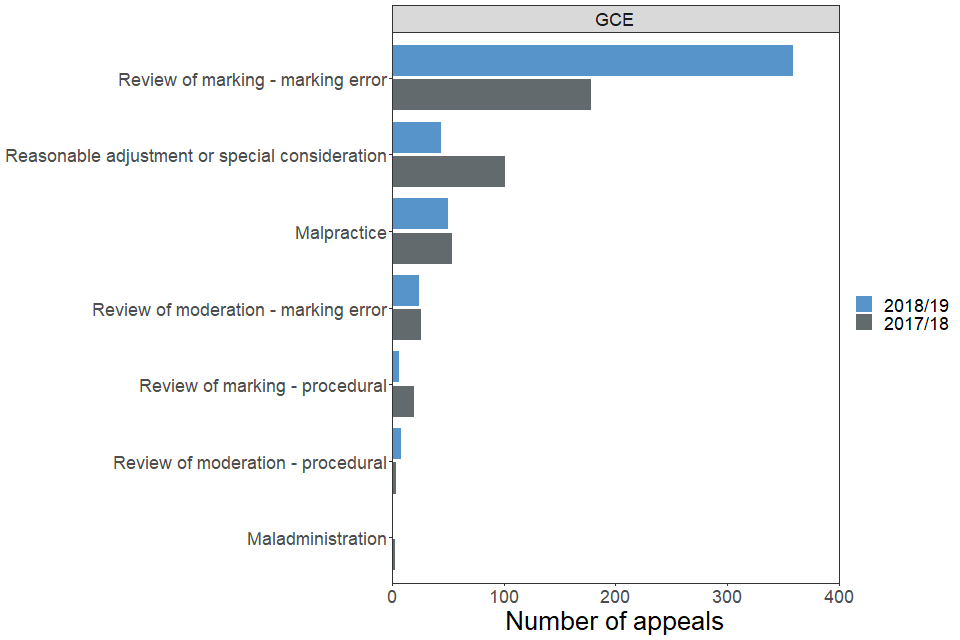
| Nature of appeal (GCE) | 2017/18 | 2018/19 |
|---|---|---|
| Maladministration | 0~ | 0 |
| Malpractice | 54 | 50 |
| Reasonable adjustment or special consideration | 101 | 44 |
| Review of marking - marking error | 178 | 359 |
| Review of marking - procedural | 20 | 6 |
| Review of moderation - marking error | 26 | 24 |
| Review of moderation - procedural | 0~ | 8 |
| Total | 386 | 491 |
For GCE in 2018/19, the largest category for appeals was ‘review of
marking - marking error’. The number of appeals related to this category
increased from 178 in 2017/18 to 359 in 2018/19 (an increase of 102%).
This is likely to reflect increased awareness about the ability to
appeal on the grounds of a marking error.
6. Preliminary appeals and appeal hearings
A preliminary appeal is a review by a senior exam board member who has not been previously involved in the individual case. As a result of a preliminary appeal, the case is or is not upheld.
If the applicant is unsatisfied with the result of the preliminary appeal, they may decide to progress to an appeal hearing, where applicants and exam boards present their case to the panel.
An appeal panel consists of 3 or more members, at least one of which is independent (i.e. has not been an employee, examiner, committee or board member of the exam board in the previous 5 years).
In 2018/19, new grounds for appeal to be considered under these arrangements (that schools and colleges can appeal on the basis that there was a marking or moderation error) were introduced for all GCSE subjects, resulting in a marked increase in the number of appeals received in these subjects.
6.1 GCSE
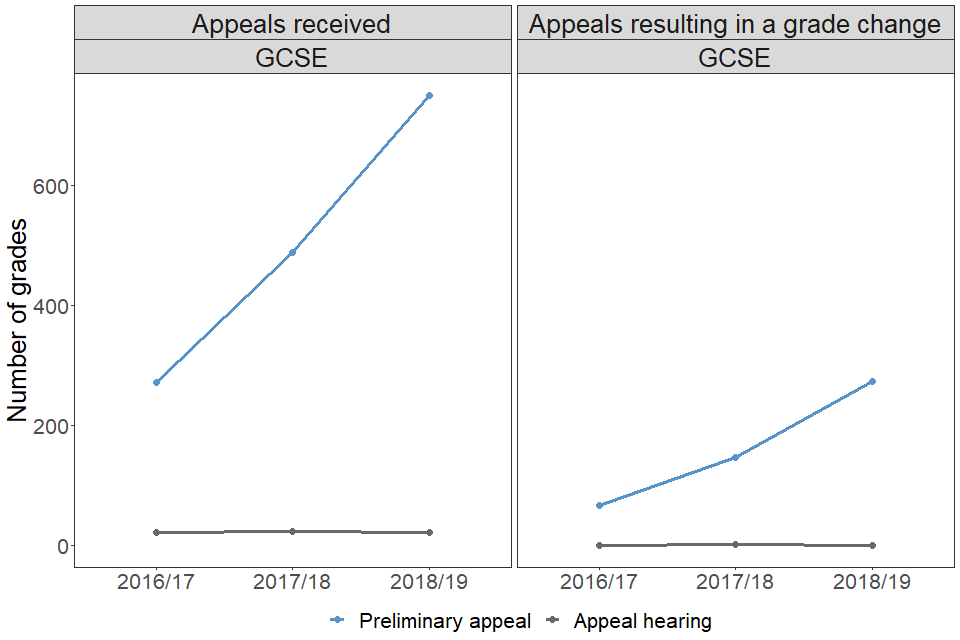
| Year | Appeals received - preliminary appeal (GCSE) | Appeals received - appeal hearing (GCSE) | Appeals resulting in a grade change - preliminary appeal (GCSE) | Appeals resulting in a grade change - appeal hearing (GCSE) |
|---|---|---|---|---|
| 2016/17 | 272 | 22 | 67 | 0 |
| 2017/18 | 488 | 23 | 147 | 0~ |
| 2018/19 | 751 | 22 | 274 | 0 |
The proportion of GCSE preliminary appeals progressing to an appeal hearing (3%) has decreased since 2017/18. Additionally, the proportion of preliminary appeals which led to a grade change (36%) has increased. There was no appeal hearing which resulted in a change of qualification grade.
6.2 GCE
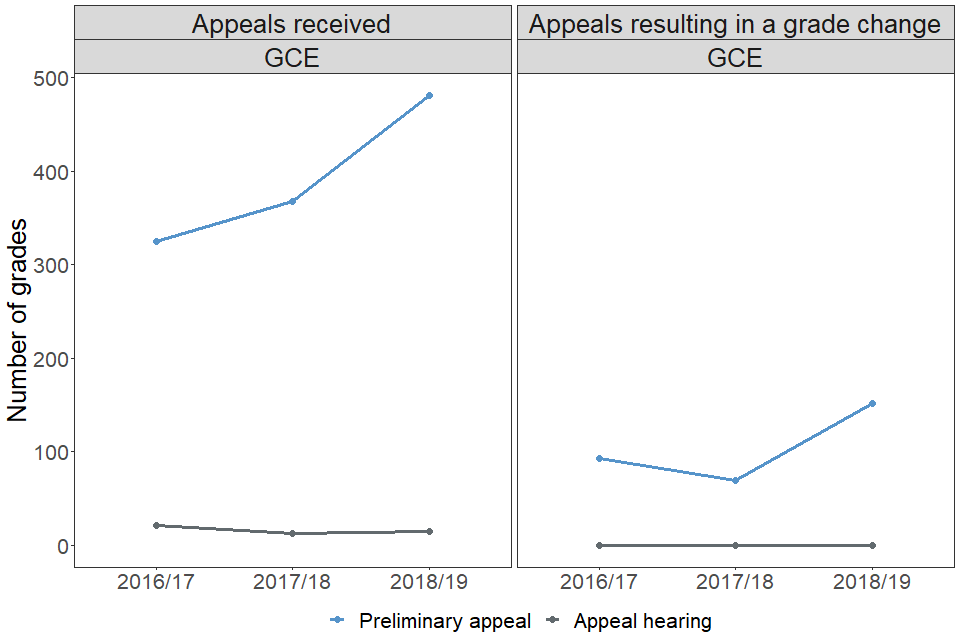
| Year | Appeals received - preliminary appeal (GCE) | Appeals received - appeal hearing (GCE) | Appeals resulting in a grade change - preliminary appeal (GCE) | Appeals resulting in a grade change - appeal hearing (GCE) |
|---|---|---|---|---|
| 2016/17 | 325 | 21 | 93 | 0 |
| 2017/18 | 368 | 12 | 69 | 0 |
| 2018/19 | 481 | 15 | 152 | 0 |
The proportion of GCE preliminary appeals progressing to an appeal hearing (3%) has stayed the same compared to last year. The proportion of preliminary appeals which led to a grade change (32%) has increased since 2017/18. There were no appeal hearings which resulted in a change of qualification grade.
7. Grades challenged and changed
A single appeal may represent one or more qualification grades which are being challenged, e.g. when a centre appeals its results for a moderated component taken by a number of its students. As shown in the table below.
| Qualification | Year | Appeals received | Grades challenged | Average number of grades challenged per appeal | Maximum number of grades challenged per appeal | Minimum number of grades challenged per appeal |
|---|---|---|---|---|---|---|
| GCE | 2016/17 | 325 | 871 | 3 | 54 | 1 |
| GCE | 2017/18 | 368 | 514 | 2 | 20 | 1 |
| GCE | 2018/19 | 482 | 1,023 | 2 | 105 | 1 |
| GCSE | 2016/17 | 272 | 2,420 | 9 | 205 | 1 |
| GCSE | 2017/18 | 489 | 898 | 2 | 96 | 1 |
| GCSE | 2018/19 | 772 | 2,182 | 3 | 112 | 1 |
An upheld appeal may result in a change to all, some, or none of the associated qualification grades. Therefore, an increase or decrease in appeals received may not be mirrored in the number of grades challenged or changed.
Additionally, a candidate may be involved in more than one appeal. In 2018/19, there were 3,087 GCSE and GCE candidates whose grades were involved in an appeal. Approximately 516 (0.009%) of the 5.9 million grades certified for these qualifications in 2018/19 were changed as a result of an appeal.
7.1 GCSE
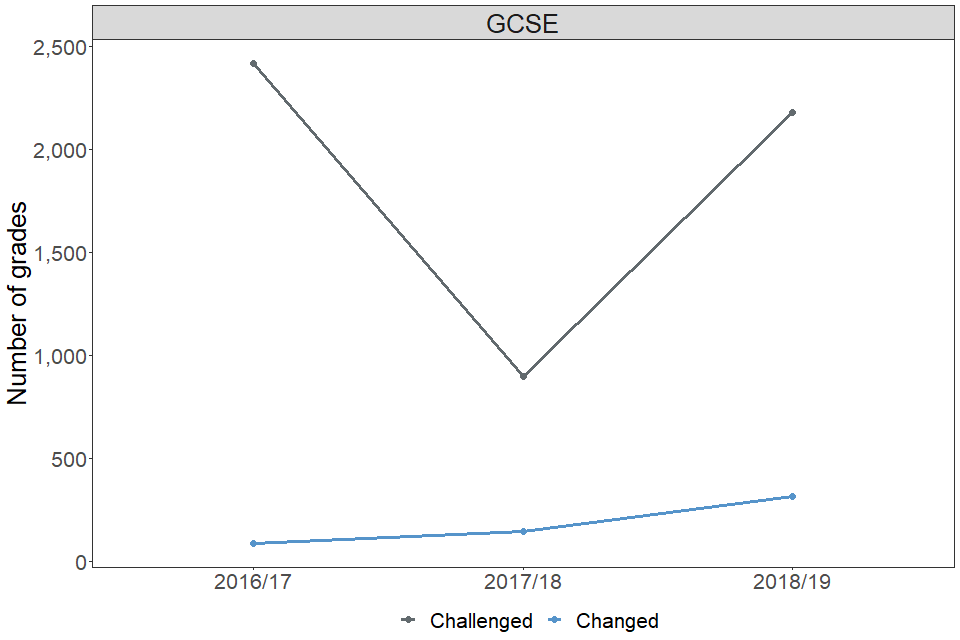
| Year | Grades challenged (GCSE) | Grades changed (GCSE) |
|---|---|---|
| 2016/17 | 2,420 | 89 |
| 2017/18 | 898 | 149 |
| 2018/19 | 2,182 | 319 |
The number of grades challenged for GCSEs in 2018/19 was 2,182. This has increased by 143% since 2017/18 where the number of grades challenged was 898. Additionally, the number of GCSE grades changed due to an appeal increased this year from 149 to 319.
The ‘V’ shape of the graph is likely to represent the end of a general decline, due to the reduction in the number of moderated components (where 1 appeal might be for a large number of candidates), followed by the incline which is likely due to the increased availability of the new grounds for appeal (marking error).
7.2 GCE
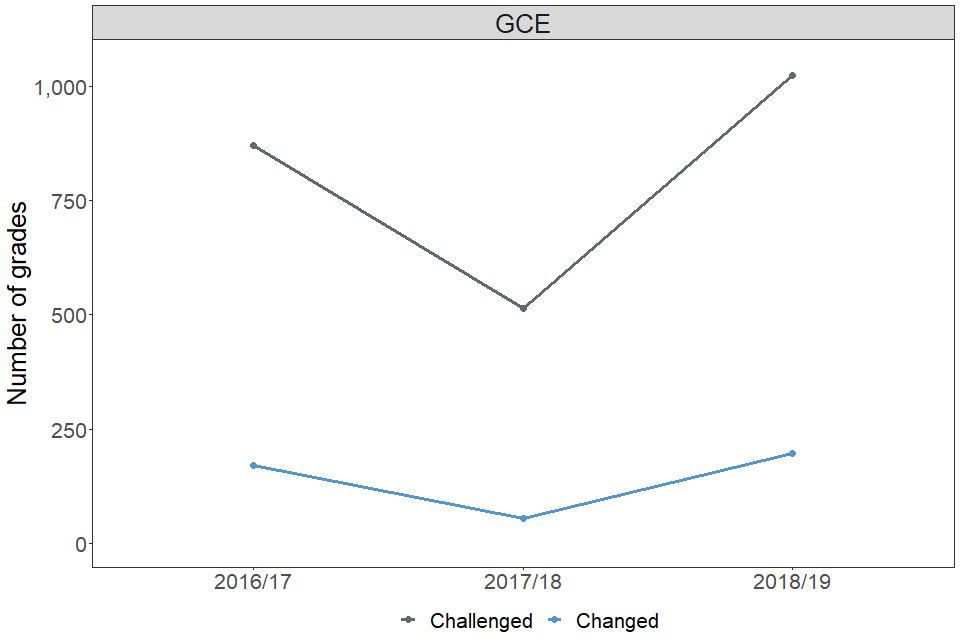
| Year | Grades challenged (GCE) | Grades changed (GCE) |
|---|---|---|
| 2016/17 | 871 | 170 |
| 2017/18 | 514 | 54 |
| 2018/19 | 1,023 | 197 |
The number of qualification grades challenged at GCE in 2018/19 was 1,023. This has increased by 99% since 2017/18 where the number of grades challenged was 514. The number of grades which were changed as a result of an appeal increased from 54 to 197. This is likely to be a reflection of the increased proportion of submitted appeals that were upheld, compared to 2017/18 (see table 3).
The ‘V’ shape of the graph is likely to represent the end of a general decline, due to the reduction in the number of moderated components (where 1 appeal might be for a large number of candidates), followed by the incline which is likely due to the increased awareness of the new grounds for appeal (marking error).
8. Completion within exam boards’ target timescales
The target timescales in 2018/19 were introduced in 2019 and allowed 6 weeks to complete a preliminary appeal from the receipt of the application, and 10 weeks to complete an appeal hearing from the receipt of a request for an appeal hearing. Prior to 2019 and since 2017, the target timescale for a preliminary appeal was 5 weeks.
For 2018/19, there are 10 GCE and 9 GCSE appeals which are still in progress at the time of this release, which might or might not be completed within the target timescale.
8.1 GCSE
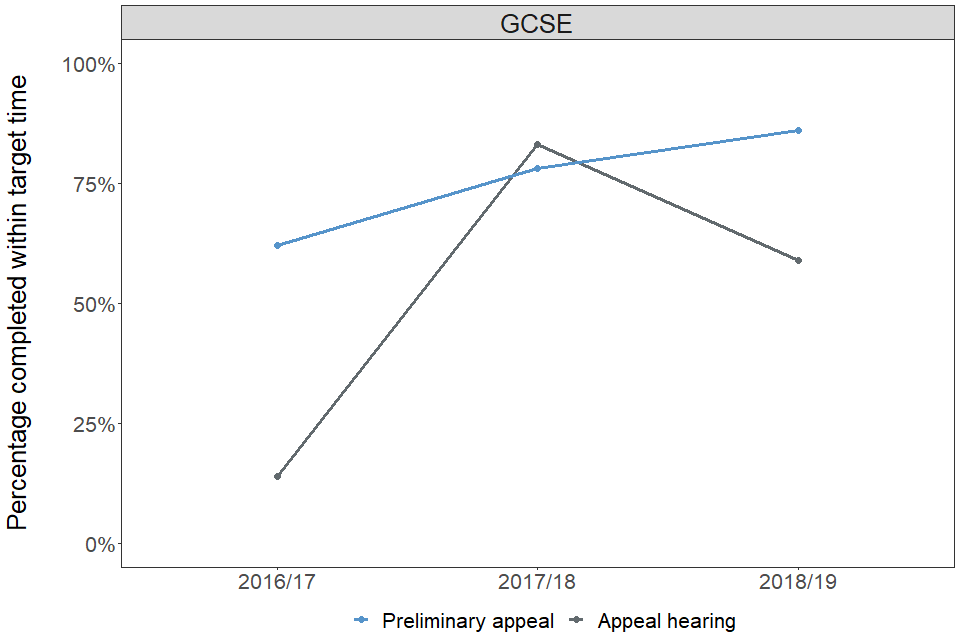
| Year | Stage of appeal | Appeals received (GCSE) | Number of appeals completed in target time (GCSE) | Percentage of appeals completed in target time (GCSE) |
|---|---|---|---|---|
| 2016/17 | Preliminary appeal | 272 | 169 | 62% |
| 2017/18 | Preliminary appeal | 488 | 380 | 78% |
| 2018/19 | Preliminary appeal | 751 | 646 | 86% |
| 2016/17 | Appeal hearing | 22 | 0~ | 14% |
| 2017/18 | Appeal hearing | 23 | 19 | 83% |
| 2018/19 | Appeal hearing | 22 | 13 | 59% |
The proportion of GCSE preliminary appeals completed within the target timescale (86%) increased by 8%, while the proportion of appeal hearings completed within the target timescale (59%) decreased by 24%. The median number of days to complete a GCSE preliminary appeal increased from 15 in 2017/18 to 21 days in 2018/19. The median number of days to complete a GCSE appeal hearing increased from 28 in 2017/18 to 58 days in 2018/19.
It is probable that this is due to the increased number of appeals made on the grounds of a marking error which generally take longer to process than administrative appeals.
8.2 GCE
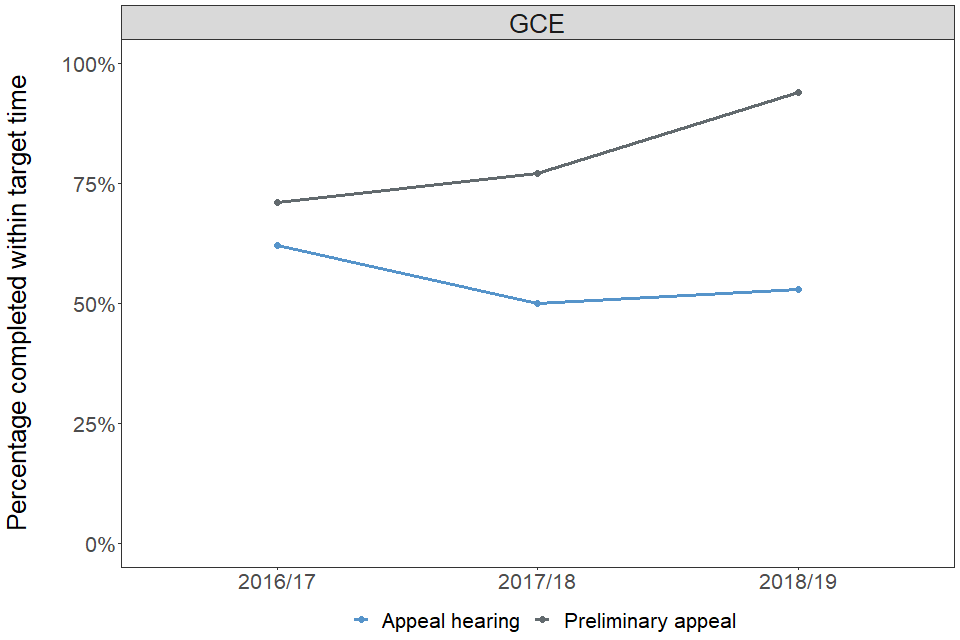
| Year | Stage of appeal | Appeals received (GCE) | Number of appeals completed in target time (GCE) | Percentage of appeals completed in target time (GCE) |
|---|---|---|---|---|
| 2016/17 | Preliminary appeal | 325 | 230 | 71% |
| 2017/18 | Preliminary appeal | 368 | 282 | 77% |
| 2018/19 | Preliminary appeal | 481 | 454 | 94% |
| 2016/17 | Appeal hearing | 21 | 13 | 62% |
| 2017/18 | Appeal hearing | 12 | 6 | 50% |
| 2018/19 | Appeal hearing | 15 | 8 | 53% |
The proportion of GCE preliminary appeals completed within the target timescale (94%) has increased by 17%, while the proportion of appeal hearings completed within the target timescale (53%) has increased by 3%. The median number of days to complete a GCE preliminary appeal decreased from 28 in 2017/18 to 28 days in 2018/19. The median number of days to complete a GCE appeal hearing decreased from 62 in 2017/18 to 56 days in 2018/19.
Again, the increase in the median number of days to complete a preliminary appeal is likely due to the increased number of appeals on the grounds of a marking error. This may be a result of an increased awareness of these grounds. Since appeals on the grounds of a marking error were available for GCEs in 2017/18 the increase is, as expected, less pronounced than that of GCSEs where appeals on the basis of a marking error were only introduced for all subjects in 2018/19.
9. Grades challenged at appeal in 2018/19
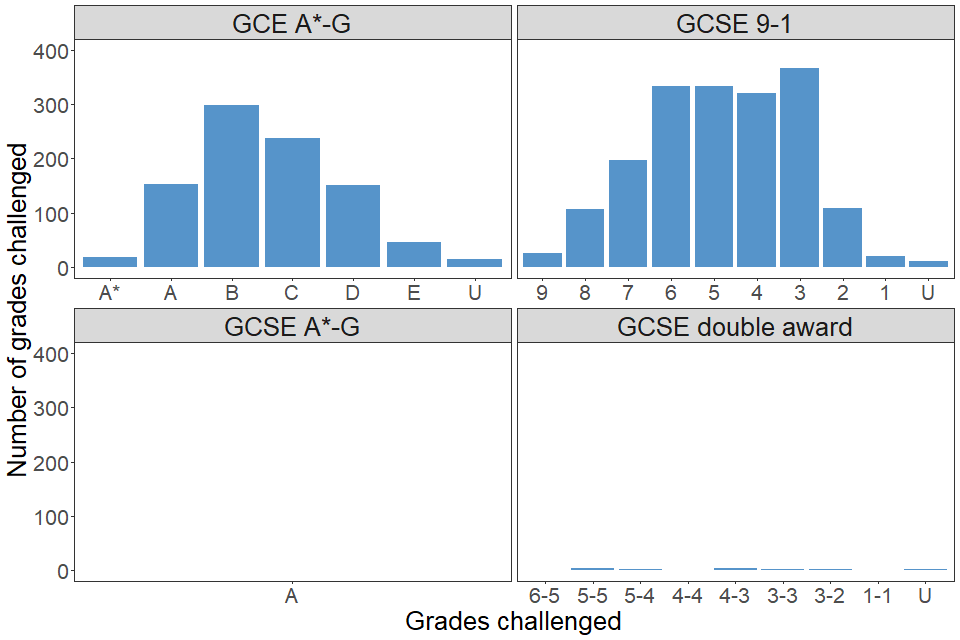
For GCE qualifications, grade B was the most contested grade. For GCSE qualifications, grade 3 was the most contested grade and there were fewer than 5 GCSE alphabetical grades challenged.
10. Raw mark changes for upheld appeals in 2018/19
The charts below show the distribution of changes to the raw marks following appeals that were upheld.
Note that all mark changes of 10 marks or more have been combined into a single category in the charts given below (shown as 10+). A change of 10 marks or more may reflect an overturned malpractice decision where the candidate was originally given 0 marks due to alleged malpractice.
10.1 GCSE
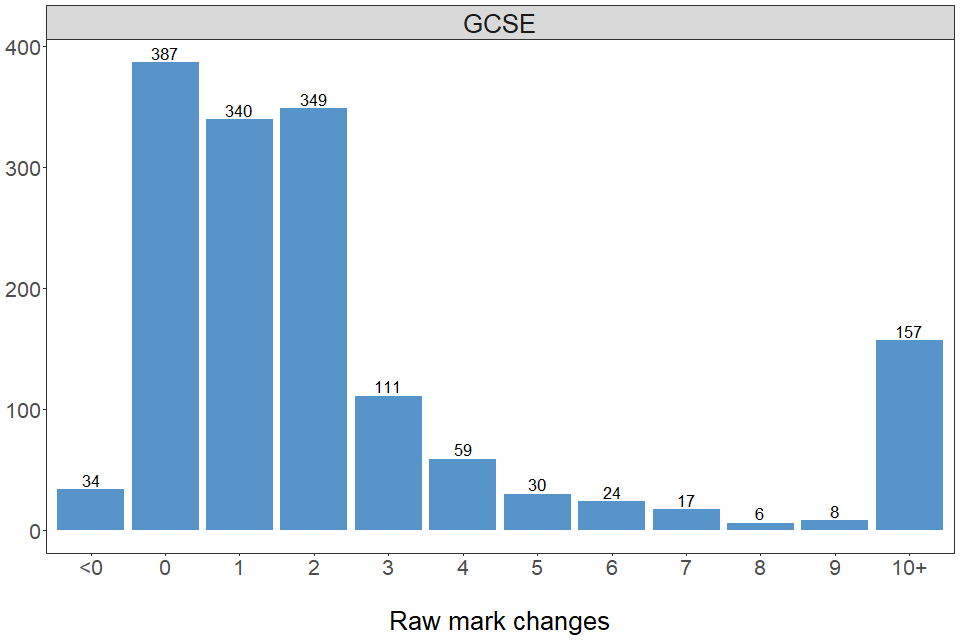
| Year | <0 | 0 | 1 | 2 | 3 | 4 | 5 | 6 | 7 | 8 | 9 | 10+ |
|---|---|---|---|---|---|---|---|---|---|---|---|---|
| 2018/19 | 34 | 387 | 340 | 349 | 111 | 59 | 30 | 24 | 17 | 6 | 8 | 157 |
Overall, 72% of upheld appeals resulted in additional marks given in 2018/19, compared to 58% in 2017/18. This is likely to be due to the increased number of appeals made on the grounds a marking error.
The most common result was a mark change of 0 (25%), followed by a mark change of 2. There were 34 appeals that led to a decrease in marks. Mark changes of 5 or more marks (around 16% of all mark changes) were predominantly from appeals on the grounds of a malpractice sanction.
10.2 GCE
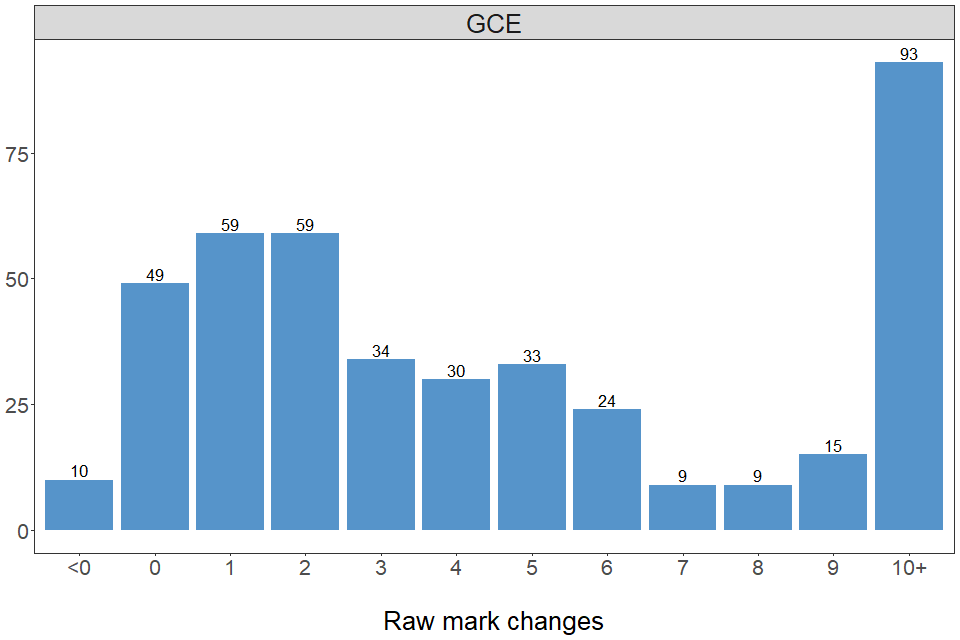
| Year | <0 | 0 | 1 | 2 | 3 | 4 | 5 | 6 | 7 | 8 | 9 | 10+ |
|---|---|---|---|---|---|---|---|---|---|---|---|---|
| 2018/19 | 10 | 49 | 59 | 59 | 34 | 30 | 33 | 24 | 9 | 9 | 15 | 93 |
Overall, 86% of upheld appeals resulted in additional marks being given in 2018/19, compared to 66% in 2017/18. It is probable that this is due to the greater number of appeals made on the grounds of a marking error.
The most common result was a mark change of 10+ (22%), followed by a mark change of 1 and 2. There were 10 appeals that led to a decrease in marks. Mark changes of 5 or more marks (around 43% of all mark changes) were predominantly from appeals on the grounds of a review of marking - marking error.
11. Grades changed for upheld appeals in 2018/19
The charts below show the magnitude of grade changes made following an upheld appeal in 2018/19. An upheld appeal may lead to a change of marks awarded to a candidate, which in turn may lead to a change of the qualification grade awarded to that candidate.
A small number of upheld appeals were in respect of candidates who were not originally given a grade. This might happen, for example, due to a malpractice investigation resulting in disqualification which was then appealed, and the appeal was upheld. Those cases do not appear in these graphs.
11.1 GCSE
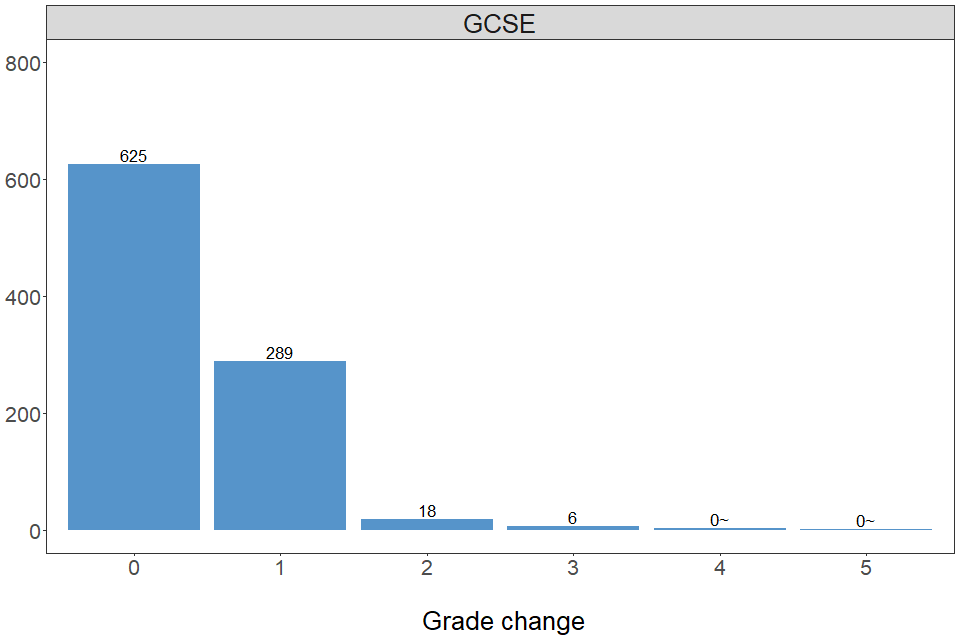
| Year | 0 | 1 | 2 | 3 | 4 | 5 |
|---|---|---|---|---|---|---|
| 2018/19 | 625 | 289 | 18 | 6 | 0~ | 0~ |
Overall, 66% of grades challenged in upheld appeals for GCSE did not result in a qualification grade change in 2018/19. Of the grades that changed, 91% changed by one grade and 9% resulted in a change of 2 or more grades.
11.2 GCE
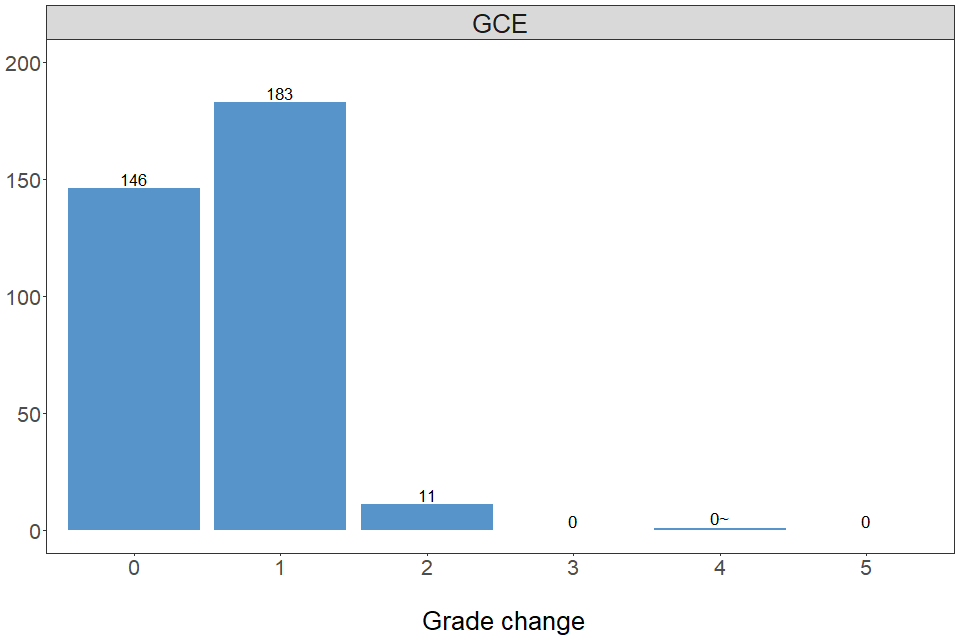
| Year | 0 | 1 | 2 | 3 | 4 | 5 |
|---|---|---|---|---|---|---|
| 2018/19 | 146 | 183 | 11 | 0 | 0~ | 0 |
Overall, 43% of grades challenged in upheld appeals for GCE did not result in a qualification grade change in 2018/19. Of the grades that changed, 94% changed by one grade and 6% led to a change of 2 or more grades.
12. Project qualifications
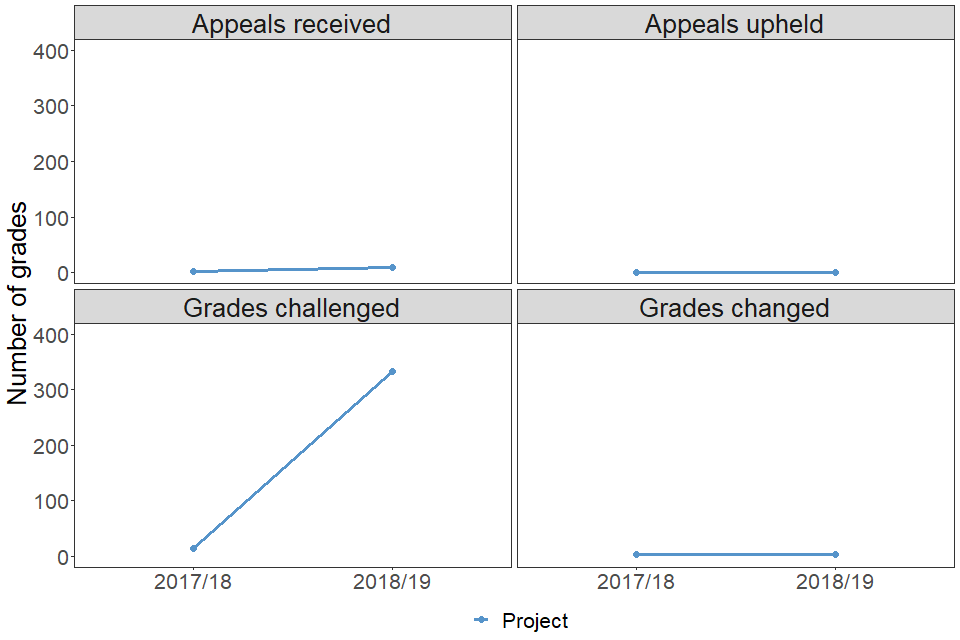
| Year | Appeals received | Appeals upheld | Grades challenged | Grades changed |
|---|---|---|---|---|
| 2017/18 | 0~ | 0~ | 14 | 0~ |
| 2018/19 | 9 | 0~ | 333 | 0~ |
In 2018/19, there were 333 candidates for Project qualifications whose grades were involved in an appeal. Approximately 0.008% (fewer than 5) of the 51 thousand grades certified for projects in 2018/19 were changed as a result of an appeal.
The number of appeals received for Project qualifications increased from fewer than 5 in 2017/18 to 9 in 2018/19. The number of grades challenged increased from 14 to 333. The number of appeals upheld stayed the same and the number of grades changed stayed the same.
Note: appeals data for Project qualifications was collected from 2017/18 onwards.
13. Contextual information
This report presents data on requests for preliminary appeals and appeal hearings made to exam boards for the academic year 2018/19. The qualifications covered in this report are GCSEs, GCEs (AS and A level) and Project qualifications in England.
Appeals can be submitted if a school or college is unsatisfied with the result of a review of marking, review of moderation, a malpractice decision, or the outcome of a reasonable adjustment or special consideration request. Appeals are made at the exam component level and, if related to the same issue, may cover more than one candidate. The Joint Council for Qualifications (JCQ) guide to the awarding bodies’ appeals process describes 2 steps for appeals:
• preliminary appeal (previously ‘stage 1’ appeal): a review by a senior exam board member who has not previously been involved with the particular case
• appeal hearing (previously ‘stage 2’ appeal): applicants and awarding bodies present their respective cases to the panel of 3 or more members, one of which must be independent of the exam board
Following a pilot in 2015/16, new grounds for appeal were introduced where the school or college believes there still to be a marking error following a review of marking or review of moderation or that a further error was made at the review stage. The new grounds were introduced in 2016/17 for all GCE subjects, 2017/18 for GCSE English language, English literature and mathematics and in 2018/19 was extended to all remaining GCSEs. The pilot found that the additional grounds of appeal provided a better opportunity for errors in marking to be identified and corrected and is likely to have resulted in an increase in the number of appeals from 2016/17 onwards. Therefore, it is difficult to make direct comparisons across years.
Further information on this release is available in the background information as well as data tables accompanying this report.
14. User feedback
We welcome your feedback on our publications. Should you have any comments on this statistical release and how to improve it to meet your needs please contact us at data.analytics@ofqual.gov.uk.
Head of profession: Vikas Dhawan

